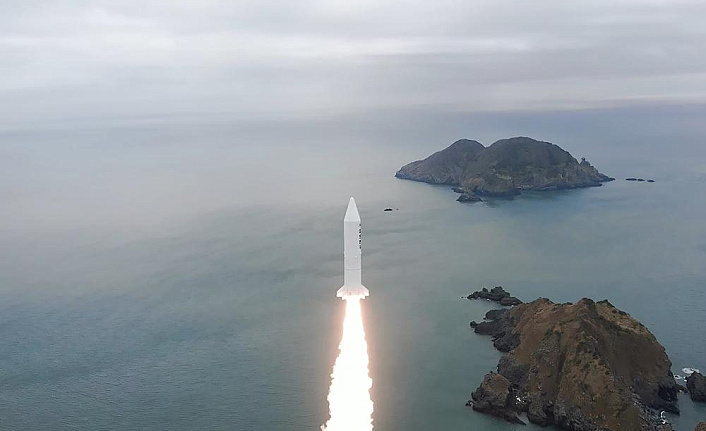Six days earlier, North Korea launched its first intercontinental missile launch since 2017. This was in apparent effort to increase its arsenal of weapons and pressure the Biden administration during stalled disarmament negotiations.
According to photos released by Seoul’s Defense Ministry, the solid-propellant rocket from South Korea soared into space before releasing a dummy satellite. According to a ministry statement, Defense Minister Suh Wook along with other high-ranking officials witnessed the liftoff.
Solid-fuel rockets are faster to launch, easier to build and more affordable than liquid-fuel rockets. The ministry announced that South Korea will soon launch a satellite spy into orbit on a solid fuel rocket.
South Korea has no military reconnaissance satellites and relies on U.S. spy spacecraft to monitor its strategic facilities.
The 2020 consent of the United States was granted to South Korea to use solid fuel in space launch vehicles. This removes a restriction Washington previously placed on its Asian ally, out of concern that it could trigger an arms race and increase the size of missiles. The United States removed other restrictions last year to allow South Korea missiles of unlimited range.
In return for missile technology from the U.S., South Korea had accepted the 1979 restrictions.
The launch on Wednesday was held amid tensions surrounding North Korea's launch last Thursday of an ICBM, breaking its self-imposed moratorium for large weapons tests and violating multiple U.N. Security Council resolutions.
The Defense Ministry of South Korea concluded earlier in the week that North Korea used a previously tested Hwasong-15 ICBM ICBM instead of the newer, larger, more powerful and longer-range Hwasong-17 it claims to have tried. It flew further and longer than any previous North Korean missile launch, putting all of the U.S. within striking distance. This was North Korea's most prominent launch since the Hwasong-15 test in Nov 2017.
The South Korean statement stated that the successful test-launches of the solid fuel space launch vehicle was a significant milestone in the military's efforts (to) build a unilateral space-based surveillance and defense system.
Recently, North Korea said that it had tested cameras for a spy satellite. Experts say that although it has launched two satellites for Earth observation in recent years, there is no evidence they transmitted images.
Lee Choon Geun is an honorary research fellow at South Korea’s Science and Technology Policy Institute. He said that the development of a solid-fuel rocket could also help improve South Korea’s missile technology. Because ballistic missiles and rockets used for satellite launches share similar engines and bodies, Lee Choon Geun believes the rocket's technology will be a significant improvement on South Korea's existing missile technology.
Lee stated that solid-fuel rockets can be used to launch small satellites as they have a weaker thrust force than comparable-sized liquid fuel rockets. Lee stated that larger satellites can be equipped with larger cameras, which produce better-resolution imagery.
South Korea's first liquid-fuel space rocket was launched last year at the desired altitude, but it failed to place a dummy payload in orbit during its first test launch.
North Korea didn’t respond immediately to South Korea’s latest rocket launch. The U.S. decision not to lift missile restrictions on South Korea was previously criticized by North Korea as a sign of Washington's hostile policy towards North Korea.
Since 1945, when they were divided in World War II, the border between the rival Koreas is heavily fortified. South Korea has been investing in high-tech weapon systems, including stealth fighter jets, to counter the increasing threat from North Korea. South Korea does not have nuclear weapons, and it is protected by the U.S. "nuclear blanket," which ensures a devastating American response to any attack on its ally.












